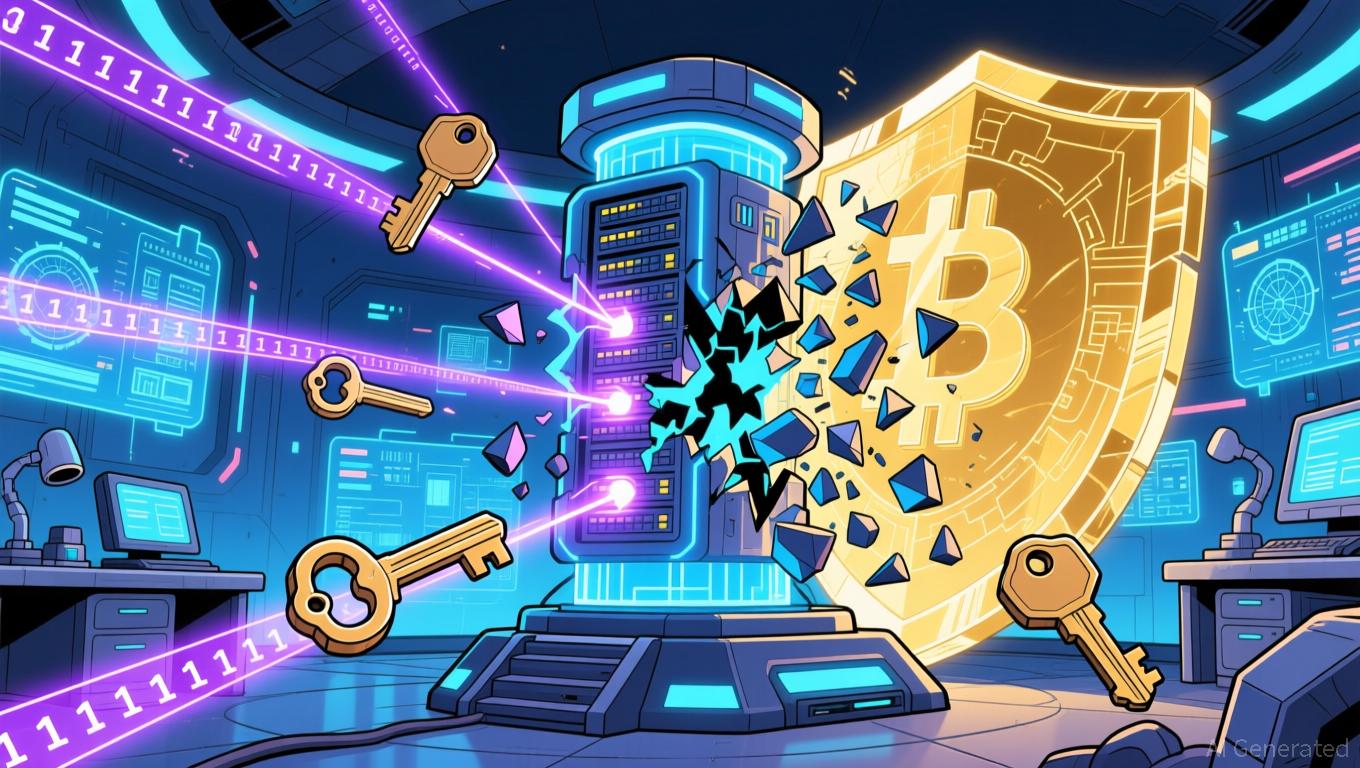Buterin: Quantum Computing May Undermine Confidence in Crypto by 2028
- Ethereum co-founder Vitalik Buterin warns quantum computing could break Bitcoin/Ethereum's ECC security by 2028, enabling private key theft. - Quantum-resistant cryptography migration is urgent as tech giants advance 1000s-qubit systems, with ECC-breaking machines expected by 2030. - Industry faces dual challenges: developing post-quantum algorithms while maintaining blockchain functionality during complex decentralized upgrades. - Buterin urges accelerated global collaboration, highlighting that delayed
Vitalik Buterin, one of the founders of
This urgency is fueled by the rapid progress in quantum computing technology. Leading companies such as Google, IBM, and research teams in China are already building quantum processors with thousands of qubits, which are the fundamental units of quantum computation.

Blockchain developers now face a dual challenge: creating algorithms that are resistant to quantum attacks and ensuring a smooth transition to these new systems. Current research is investigating lattice-based cryptography and other post-quantum techniques that can withstand quantum threats. However, adopting these new solutions will require significant changes to digital signature mechanisms, wallet infrastructures, and smart contracts—changes that must be implemented without disrupting services for millions of users. Buterin
The industry’s response has been varied. Some projects are actively testing quantum-proof algorithms, while others are reluctant to proceed due to the complexities involved in migration. The decentralized structure of blockchains makes upgrades more difficult, as any significant modification requires broad agreement among participants.
Analyze the effects of Bitcoin using the MACD Golden Cross from 2022 to the present.
The implications go beyond technical challenges. A successful quantum attack could severely damage confidence in cryptocurrencies, which already face doubts from traditional financial institutions and regulatory bodies. Buterin’s broader concerns about centralization in crypto—such as dependence on Google logins or custodial exchanges—point to a deeper issue: decentralized platforms must find a balance between ease of use and robust security. For example,
On a global scale, governments are also stepping up their quantum security efforts. The United States and its partners are strengthening collaborations in quantum research, while China is rapidly advancing its own programs. At the same time, private companies like Scope Technologies Corp. and IBM are
Buterin’s alert is a call to action. As quantum computing approaches practical application, the crypto sector must move swiftly to safeguard its foundational security. According to him, failing to adapt could not only result in financial damage but also undermine the trust that is central to cryptographic systems.
---
Disclaimer: The content of this article solely reflects the author's opinion and does not represent the platform in any capacity. This article is not intended to serve as a reference for making investment decisions.
You may also like
DASH Soars by 150%: Exploring the Drivers and Long-Term Viability
- DASH's 150% price surge in 2025 stems from speculative trading, whale activity, and growing on-chain engagement despite 15.84% November volatility. - Privacy tools like PrivateSend obscure 77% of transactions, creating transparency challenges as Chainalysis reports only 23% traceability amid regulatory scrutiny. - Institutional interest remains ambiguous due to DASH/DoorDash ticker confusion, with no confirmed 2025 crypto partnerships despite reported stock ownership increases. - Exchange listings on Kra
Vitalik Buterin’s Latest Support for ZK Technology and What It Means for Blockchain Expansion
- Vitalik Buterin advocates ZK technology as Ethereum's solution to scalability-privacy challenges, highlighting ZKsync's 15,000 TPS Atlas upgrade as a key milestone. - He proposes removing modexp precompile to streamline ZK-rollups despite potential gas fee increases, emphasizing efficiency over technical complexity. - ZK-based assets like ZKsync and StarkNet gain institutional traction through interoperability, Bitcoin integration, and regulatory-aligned privacy solutions. - $55M Succinct Labs funding an
Vitalik Buterin Has Recently Expressed Public Backing for ZKsync and What This Means for the Future of Ethereum Scalability
- Vitalik Buterin endorsed ZKsync's Atlas upgrade, praising its 15,000 TPS capacity and ZK-based scaling potential for Ethereum . - ZKsync's cost-efficient zk-rollups ($0.01/tx) and privacy focus differentiate it from Arbitrum and Optimism in Layer-2 competition. - Buterin's backing boosted ZK token 50% and validated ZKsync's institutional appeal, with TVL growing rapidly despite trailing top Layer-2s. - Upcoming Fusaka upgrade aims to double throughput to 30,000 TPS, positioning ZKsync as a high-growth as
ZK Atlas Upgrade: Transforming Ethereum’s Scalability and Accelerating Layer 2 Integration in 2025